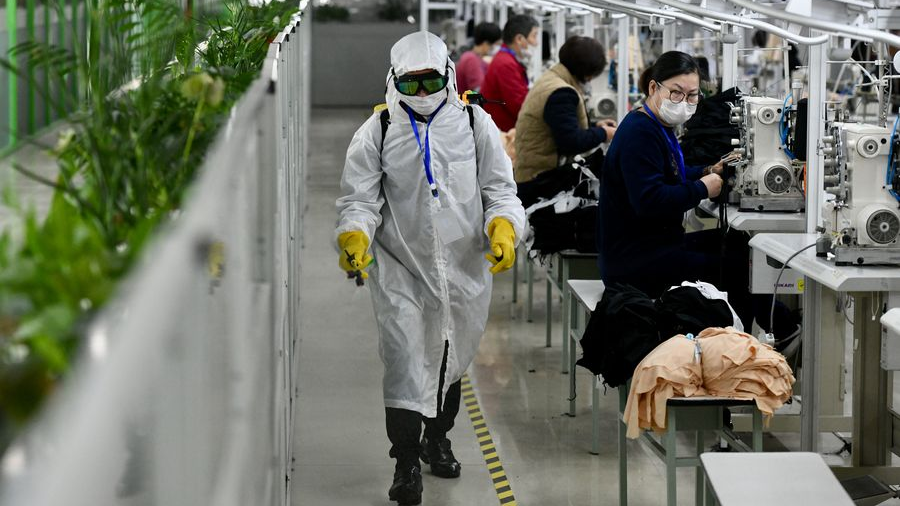
A staff member disinfects a workshop in Jinjiang City of southeast China's Fujian Province, February 20, 2020. /Xinhua
A staff member disinfects a workshop in Jinjiang City of southeast China's Fujian Province, February 20, 2020. /Xinhua
Editor's note: Jonathan Arnott is a former member of the European Parliament. The article reflects the author's opinions, and not necessarily the views of CGTN.
From the hustle and bustle of the vibrant Silk Road network to the wealthy medieval city state of Venice, humanity understood a millennia ago that trade – buying and selling goods – drives prosperity and increases wealth. With the Industrial Revolution in progress, the flow of goods and services was rumored to lead Napoleon to describe England as "a nation of shopkeepers."
Back in the 13th century, Venice had become the richest city on earth. It imported silk from China, Egyptian cotton, and sugar from Cyprus as it became a gateway for global trade. But in January 1348, there was an outbreak of bubonic plague. Tens of thousands of people died. The word "quarantine" itself comes from Venice, deriving from the old Italian "quarantena," meaning 40 days. Ships were required to anchor offshore in a lagoon off the island of Poveglia, to prove that they were not carrying the "Black Death." The measure saved lives, though there was a huge cost to the Venetian economy.
There is an inevitable trade-off when it comes to our response to the COVID-19 pandemic: governments across the world choose between saving lives, protecting their economy, and protecting civil liberties. It is not an exact science – during a pandemic, it is impossible to keep an economy fully open because (irrespective of whether government imposes restrictions) many people choose voluntarily to limit their contact and curtail spending.
Even the Financial Times recently published an opinion piece entitled "COVID exposes Capitalism's flaws." Its author, Mariana Mazzucato, is an economist originally from Venice and now a professor at University College London. There is much of the piece which I don't agree with. Vietnam's success in fighting the COVID-19 pandemic can be better attributed to other factors, such as its experience from the SARS outbreak, than to its economic system. But there is also an important point raised about the nature of the relationship between the private and public sectors.
A strong private sector can do many things, but it is often forced to focus upon its immediate issues, not always capable of planning for the future. Government, on the other hand, is required to plan. At heart, I believe that businesses should be given as much freedom as possible to do what they do best: creating jobs, creating money and driving the economy. Yet there are times when the private sector is incapable of doing so. If a company does not have the money to pay its staff wages next month due to the current pandemic, it is hardly in a position to plan for the next year.

Doctors and nurses clap after general manager of COVID Recovery, Becky Board, administers the first Pfizer-BioNTech COVID-19 vaccine in London to patient George Dyer, 90, at Croydon University Hospital, at the start of the largest ever immunization program in the UK's history in London, United Kingdom, December 8, 2020. /Getty
Doctors and nurses clap after general manager of COVID Recovery, Becky Board, administers the first Pfizer-BioNTech COVID-19 vaccine in London to patient George Dyer, 90, at Croydon University Hospital, at the start of the largest ever immunization program in the UK's history in London, United Kingdom, December 8, 2020. /Getty
Professor Mazzucato writes about conditionalities – where government assistance is intended to drive change. She offers the example of Denmark, where companies using offshore tax havens were denied state aid. This also formed part of the United Kingdom's economic response to the COVID-19 pandemic, where business loans for large companies were conditional on dividends paid to shareholders. But such conditionality does not need to be driven by subsidies. Rather than providing subsidies for the sale of electric cars, for example, a government could assist the private sector by reducing or abolishing value added tax on the purchase. It is not necessary to conclude that the economic system is flawed in order for governments to drive desired social change.
To me, the real lesson of the COVID-19 pandemic is that government should do what only the government can do – empower the private sector to get on, with minimal interference, doing what it does best. Innovation has been driven by countless companies during this pandemic. Of all the European nations, Iceland stands out as the most effective in the fight against COVID. It is a particularly cold nation, with substantial seasonal migration leading to multiple introductions of the virus.
From the beginning of the outbreak, Iceland turned to biopharmaceutical company deCODE genetics. They swiftly repurposed their laboratories for COVID testing and genome sequencing, using private testing to bolster public testing. As a result, Iceland has minimized economic disruption and kept case numbers and deaths far lower than comparable nations. It's this kind of partnership, where the government is able to place trust in the private sector to deliver and work side-by-side with it without undue interference, which should be a model for the future.
The COVID-19 pandemic will, no doubt, lead us to re-evaluate our approach to how government and business interact. The future will doubtless look very different, but equally we should be reluctant to abandon those parts of the system which have served us well for centuries.
(If you want to contribute and have specific expertise, please contact us at opinions@cgtn.com.)

